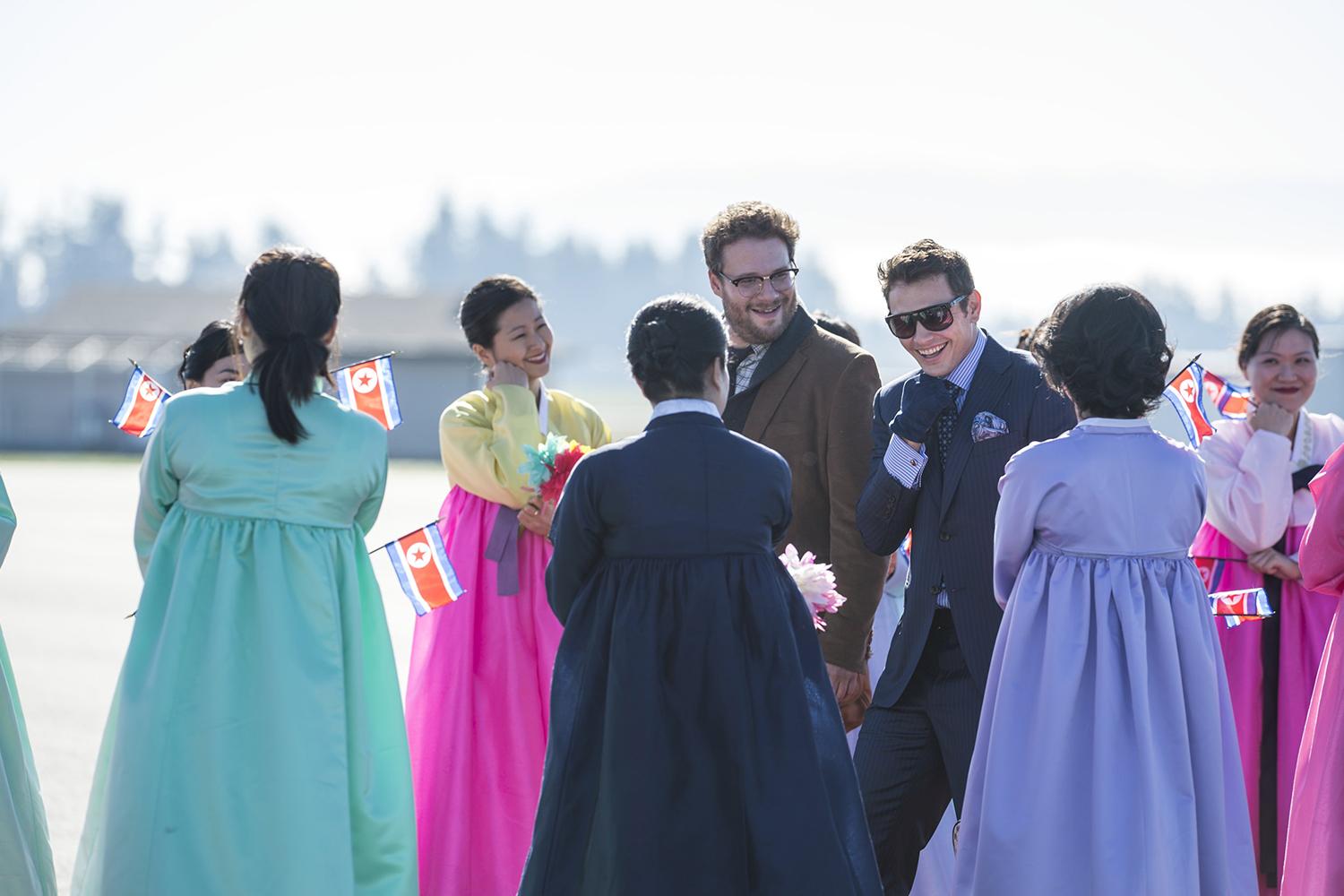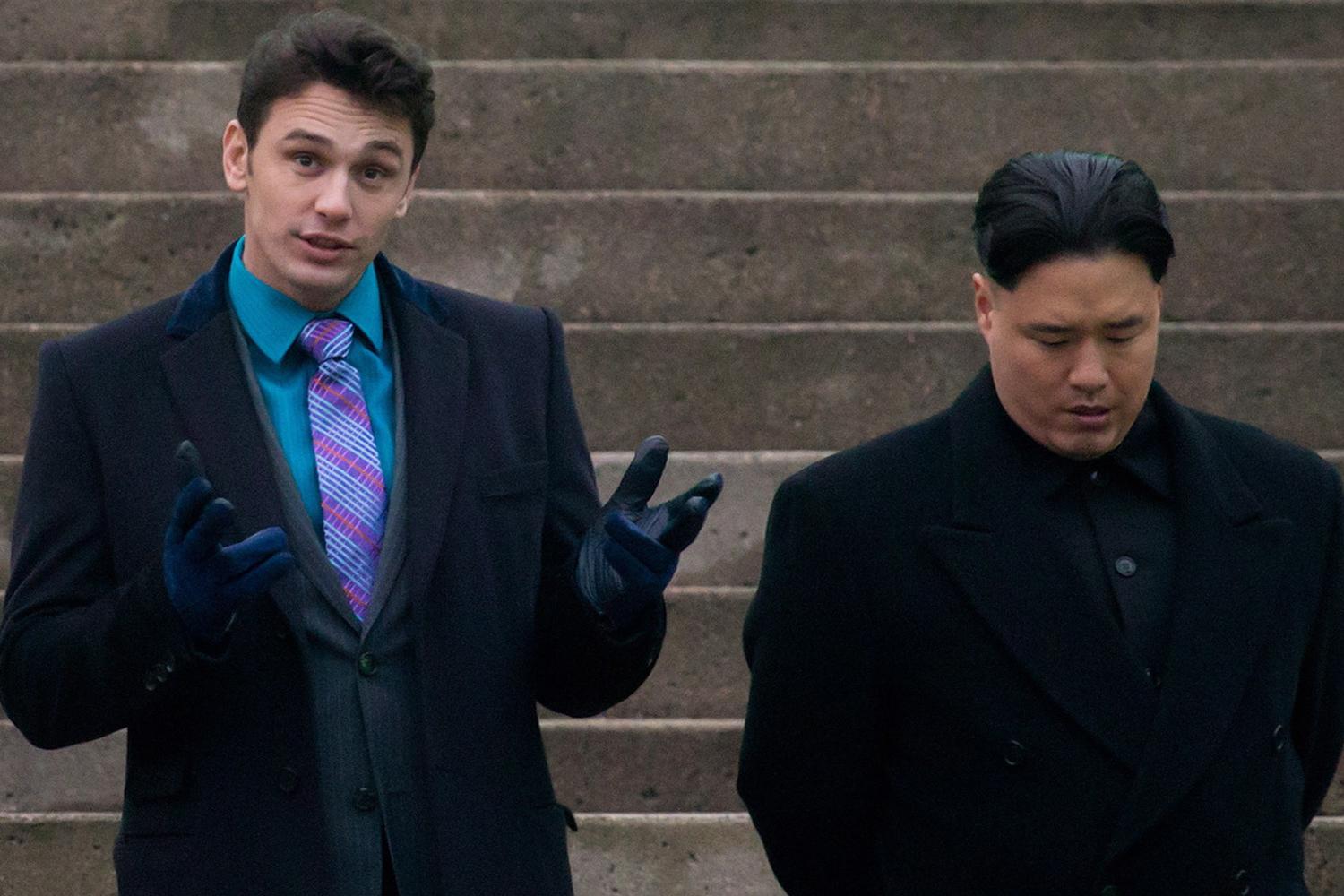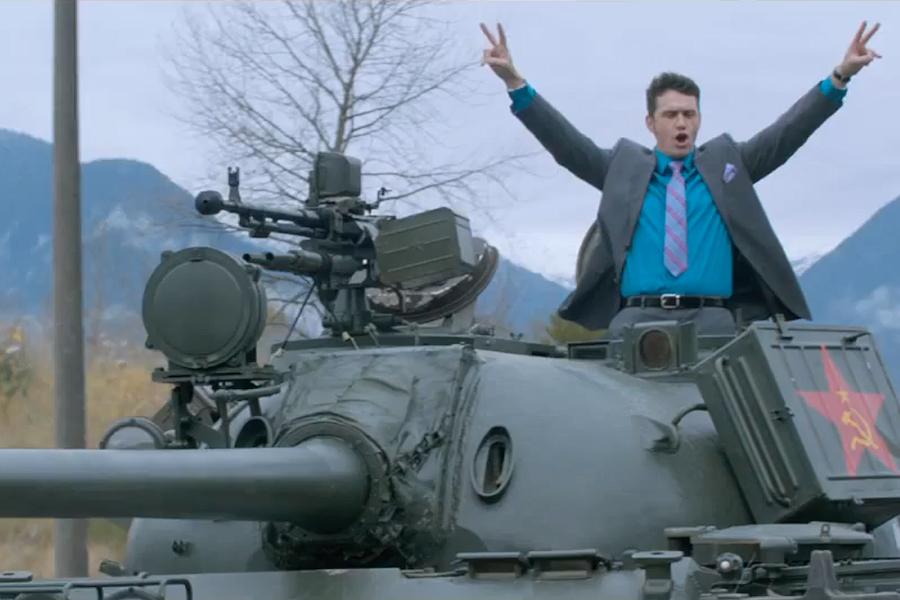Editor’s note: Sony’s opted to cancel The Interview’s December 25 release, but Digital Trends had a chance to catch a press screening about a week before that decision was made. Our review is posted below, along with details we traditionally omit from reviews (spoiler alert!), including exactly what happens to North Korean leader Kim Jong-un in the film. We’ll let the text speak for itself.
The Interview features a baker’s dozen of music montages within the first 45 of its 112 minutes, and nearly all of them run 30 seconds too long. That’s a whole hell of a lot of slow-mo partying, posing, and mugging for the camera — especially for what in the end feels like a pretty limp action-satire.
Are gossip peddlers like Aaron Rapoport and his sociopathically juvenile ward Dave Skylark — the inseparable Seth Rogen and James Franco — leading awesome enough lives to merit this constant barrage of dramatically trip hop and quick cuts? Is their quest to assassinate North Korean dictator Kim Jong-un? Nope!
As the montages stack up, punctuated by poorly knit passages of exposition and awkward scenes of Your Highness-caliber bro humor (drugs, homosexuality, boobs, and dicks are inherently funny?) a painful pattern emerges: Evan Goldberg and Seth Rogen have finally gone too big. Superbad‘s teen weekend odyssey led to the ’80s-tinged action freakout success Pineapple Express (and failure Green Hornet), on to the claustrophobic meta humor of This Is The End, and as they raised the ante it seemed to work.
As propaganda, The Interview doesn’t even rise to the rallying level of 1940s Captain America comics
But an international spy satire with big set pieces and a notoriously aggressive real world punching bag villain in North Korea? That ambitious increase in scale is too much for the writing/directing duo; the movie is too conceptually top heavy to pull off. When it does topple halfway through though, turning into an avalanche of absurd violence and high stakes, only sheer momentum carries it through. The Interview succeeds only by committing its second half to raw absurdity.
There are two distinct movies here: the montage-thick first and the far more focused second. In the first, Skylark Tonight, a 20/20-meets-Perez Hilton interview show hosted by Dave and produced by Aaron, hits the 1,000-shows mark and its producer is feeling inadequate. Is he really a journalist or just a shill carried by the success of Franco’s manic star? Dave suggests they interview Skylark Tonight superfan Kim Jong-un to simultaneously up their cred and mollify Aaron’s barely existent ethical compass. And they’re asked by the CIA to murder Jong-un to prevent nuclear war.
Little in this first part of the movie works.

Franco’s performance gives Skylark less personality than the Joker-approved suits worn by his character, and Rogen seems like he’s on autopilot, blankly bored and surly even when traveling across China for an initial meeting with North Korea’s propaganda machine (a journey that’s, of course, 99 percent montage.)
Even the flick’s blank acknowledgement in the first scenes that it will rely on the tired crutch of gay-dick-boob jokes reads less like winking self-awareness and more like surrender. What have we got, Evan? I dunno, something about wieners, Seth. Fine, write it.
But then things get weird. The movie picks up when Kim Jong-un finally appears, played with smooth affability and legitimately fragile menace by Randall Park. The montages don’t stop, but they do slow to a trickle as Jong-un and Skylark form a ridiculous friendship based on shared insecurity. Park and Franco have an appealing anti-chemistry on screen: Both characters are aggressively stupid and loathsome, but their bond is real fun and in a single scene, the movie tumbles into madness. A ballroom scene in Jong-un’s palace shifts from dull, giddy silliness into an alienating bloodbath in one fell swoop. Goldberg and Rogen reel back for a wide shot of the whole mad scene and linger, milking a big laugh out of the discomfort.
Is it dangerous filmmaking? Not especially.
Thus begins the darker and far more fun movie inside The Interview. Aaron and Dave inevitably recommit to their mission in North Korea, as well as to the actual interview, while never losing the anxious inertia born of that crazy ballroom scene. While those two characters never grow much in meaningful ways, the second half does make way for another great performance from Diana Bang as Sook, Jong-un’s press secretary. Of all the characters, she’s the only one who seems to give a damn about anything, and she’s a vital anchor for the violence surrounding her.
For one sinking moment, it seems like The Interview is going to make the catastrophic misstep of trying to have a message. Dave and Jong-un snipe at one another, trading barbs about North Korea and the United States’ equal mistreatment of its poorest citizens, a subject that the movie simply isn’t equipped to handle with any grace. But rather than focus on that dialogue, the camera shifts away — to Seth Rogen getting his finger bitten off by a cameraman.
Moments like this reveal the cunning misdirection at work in The Interview, a movie that buckles under its premise but succeeds in succumbing to its weight, winning through sheer spectacle.

And it is a spectacle. As Skylark’s interview progresses, the film itself pours on the violence and scatological humor to heights that recall Spielberg’s1941. A cameraman looking to preserve Jong-un’s public image doesn’t just bite off one of Rogen’s fingers, he bites off a second, all while the perspective shifts between Skylark and Jong-un, the broadcast control room, and the North Korean public watching on their TVs at home, baffled by what they’re seeing. Then Rogen, in the struggle, bites off one of the cameraman’s fingers while Sook holds other loyalists at bay. As Jong-un’s military moves to storm the interview, Skylark coaxes Jong-un into tearfully confessing his insecurity about ruling in his father’s shadow. Then the dictator literally craps his pants.
The Interview succeeds only by committing its second half to raw absurdity.
Guns, blood, devoured digits, and a poop joke. The ingredients in The Interview‘s conclusion aren’t at a base level so different than those at the beginning, but they’re assembled into a far more appealing, surreal shape as everything continues to escalate. Bro humor taking pot shots at the modern media machine and a real world dictator isn’t intrinsically moving stuff, but Rogen and Goldberg’s chaotic escalation places these puerile elements into unfamiliar context. By the time Rogen and Franco are driving a Soviet tank through a field of nuclear warheads emerging like terrifying trees around Jong-un’s estate, the movie’s bizarre reality finally feels complete.
Is it dangerous filmmaking, though? Not especially. As propaganda, The Interview doesn’t even rise to the rallying level of 1940s Captain America comics — and it pales in comparison to equally aged satire like Duck Soup. Rogen and Goldberg have made a wobbling, uneven farce that comes together in the back half. They have, however, also made a movie wherein the dictator of the world’s most isolated nation craps himself before getting blown up by a rocket propelled grenade. In slow motion. While Katy Perry’s “Firework” blasts.
Offensive? Certainly to some people. Had the movie given any weight to the persistent human-rights violations of the North Korean people, or even the never-ending military meddling of the CIA in world affairs, it might play as something legitimately incendiary. As it is, The Interview is simply Rogen and Goldberg’s most impressive and uneven collection of fart and dick jokes.
(Media © CTMG)
Editors' Recommendations
- Dumb Money trailer reveals the people behind the GameStop stock squeeze
- Smile review: A cruelly scary studio horror movie
- The Suicide Squad review: James Gunn makes a body count beautiful





